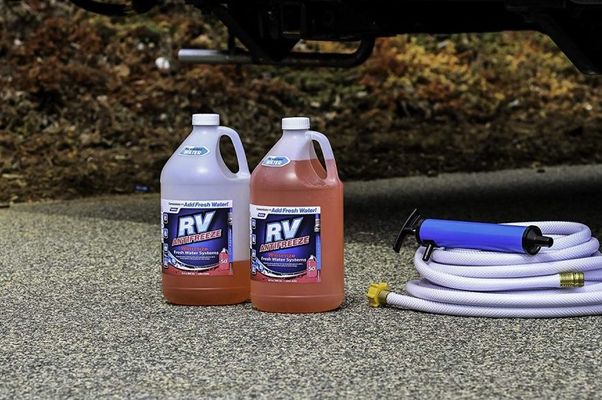
Homemade DIY RV Antifreeze Recipes (Helpful Guide and Tips)
Just about every commercial product you need is going to cost you some big dollars. Even the smaller amounts tend to add up if you buy enough of them. The way to save money is to start making your own anti-freeze. It can be done and you will save.
To make your own RV anti-freeze or coolant, all you need to do is mix aluminum-safe glycol and some water and you are on the road to saving some money. It just takes finding the glycol at a nice inexpensive price to save on your coolant bill.
To learn more about this topic, just continue to read our article. It explores the issue so you get the best information possible. Take a few minutes to see if this anti-freeze/coolant option is right for you
Substitute For RV Antifreeze

It turns out that there are a lot of substitutes for antifreeze. One product you should avoid using is denatured alcohol. It is not made to be drunk so when you de-winterize you have to flush all this type of alcohol out of the water system before drinking from it.
But there are some healthier options you can use. One suggestion is non-poisonous alcohol will work. Just mix it in a 35 to 65% ratio of alcohol to water and you should be able to survive up to 0 degrees F.
Another solution was ethanol, but make sure it is ethanol and not methanol. To be more specific, some RVers have used Vodka with some success. But the best solution would be to use the aluminum-safe glycol or food-safe glycol mixed with water.
When you mix it with water, your cost may be 1/4 to 1/2 of the cost of regular RV antifreeze.
DIY RV Antifreeze

The trick to winterizing your trailer or RV is to make sure you use the right products. The ones listed above are just some ideas you can use if you are inclined to winterize your trailer the traditional way.
There are other ways you can protect your pipes through the winter without going to the trouble of buying glycol, Vodka, or even ethanol. One option which some RV owners use is blowing the water out of their system
They use compressed air to push the water out but do not go above 40 PSI to do this task. Other RV owners use portable heaters to keep their pipes nice and warm. This can get expensive but it works.
Finally, you can install or upgrade insulation. Having great insulation means that your pipes are well protected without going to the expense of buying RV antifreeze. Skirting will help the insulation work better also.
How To Make Non-Toxic Homemade Antifreeze

The recipe is simple for this project. Just go out and buy some food-grade or aluminum-safe glycol and buy some distilled water from Walmart or some other grocery outlet and you have all the ingredients you need.
The key to buying the glycol is to make sure it has corrosion inhibitors inside. A 2% level should be sufficient. Then all you need to do is mix a 50 to 50 ratio and you have yourself some non-toxic RV antifreeze.
With this mixture, you should have a freezing point of about -25 degrees F but your results and freezing point may vary depending on your mixture ratio and soon. Here is a chart to help you get the right mixture for the freezing point you want.
Can RV Antifreeze Be Diluted?

This type of antifreeze is sold in 2 formats. The first format would be the concentrate. This is the option that can be diluted and you should follow the instructions on the label to make sure you get the right amount of water to antifreeze for the protection you want.
The second format is pre-mixed or ready to use RV antifreeze. This product is the one you cannot or should not dilute. It is pre-diluted to a certain ratio to give you maximum protection during those cold winter months.
For the best protection, the ratio you want is a 50/50 split. Undiluted antifreeze freezes at a higher temperature so you want the water in the mix to make sure you have the right freezing point.
Make sure to stir well when you mix the water and the concentrated antifreeze together. You want the RV antifreeze fully diluted before adding it to your plumbing system.
Can You Add Water To The RV Antifreeze?

Only if it comes in a concentrated format. Any other format would mean diluting the antifreeze so much that it won’t offer you much protection. Undiluted antifreeze can cause your pipes to freeze which means that you could have burst pipes before winter is over.
You will want enough water mixed in with the anti-freeze to avoid those problems. Just a note here for when you go shopping for commercially made antifreeze.
Many companies will use the phrase ‘made from virgin ingredients’. This phrase simply means that their RV antifreeze is not made from recycled ingredients.
Some cheaper RV antifreeze products are made from recycled ingredients which is why those products do not cost a lot. When you go to dump your homemade antifreeze, do not flush it down the toilet, empty it into the sewer or dump it on the ground.
Dispose of it like you would regular commercially made antifreeze. Go to your local dump and deposit it there. It is just the best way to dispose of this liquid.
Some Final Words
The formula needed to make your own RV antifreeze is not difficult to follow. Just make sure to mix the product you choose with the right amount of water to get the best protection.
If you do not want to use any antifreeze, then use some of the other suggestions mentioned above. They work just as well and you won’t have to dispose of them when winter is over.

